|
|
|
Sort Order |
|
|
|
Items / Page
|
|
|
|
|
|
|
| Srl | Item |
| 1 |
ID:
129872
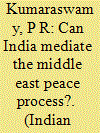

|
|
|
| 2 |
ID:
109813
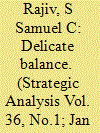

|
|
|
|
|
| Publication |
2012.
|
| Summary/Abstract |
India's foreign policy interactions with Israel are marked by a political discreetness which is in contrast to its prominent political engagement with the Palestinians and countries of the Arab world. India plays down its robust defence engagement with Israel, censures Israeli policies regarding the Palestinians, supports Palestinian-related resolutions at multi-lateral forums like the UN, differs strongly from Israeli policy on issues such as Iran's nuclear programme while being opposed to the possibility of Iran acquiring nuclear weapons capability. This policy has expanded the space for India to pursue its foreign policy and national interest goals, as attested to by the robust political and economic interaction with the Palestinians and the Arab countries, and rising defence and economic engagement with Israel despite certain domestic constituencies opposed to such a partnership. However, the limitations of such a policy include the minimal role that India has been able to play in the Middle East peace process, 'diplomatic heartburn' of an ally deeply involved in the security sphere-as is evident in the Israeli reaction to the Indian stance on the Goldstone report, for instance-and limited 'comfort zones' if crisis situations arise. Greater political engagement could be a bulwark against such tendencies and also provide important opportunities to convey India's concerns regarding the Palestinians more forcefully.
|
|
|
|
|
|
|
|
|
|
|
|
|
|
|
|
| 3 |
ID:
132381
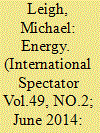

|
|
|
|
|
| Publication |
2014.
|
| Summary/Abstract |
Energy trade cannot overcome longstanding political conflicts. There are no 'peace pipelines' anywhere in the world. Rather peace is a condition for investment in pipelines and other forms of energy infrastructure. Where political breakthroughs have been achieved, however, energy trade can reinforce cooperation between states and contribute to regional stability. These considerations are particularly pertinent to the Cyprus settlement talks and Middle East Peace Process, against the background of energy discoveries in the Eastern Mediterranean.
|
|
|
|
|
|
|
|
|
|
|
|
|
|
|
|
| 4 |
ID:
138933
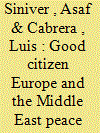

|
|
|
|
|
| Summary/Abstract |
According to Evans (2007), for political actors to be “good international citizens,” they ought to recognize and promote respect for core human rights in their foreign policy, engage in vigorous multilateral cooperation, and contribute to positive change whenever possible. This study assesses this approach in the context of EU foreign policy by asking two questions: What sort of ethically oriented action should be expected of a foreign policy actor in the current global system? What are the barriers to achieving such action that naturally arise in that system, given the way it is constructed? We argue that the answer lies in recognizing not only the practical challenges or constraints, but also the normative constraints facing such actors in a foreign policy framework. First, we apply a good international citizenship framework in the case of EU foreign policy. We then assess EU actions in the context of the Middle East peace process, focusing on the efforts the union has made, and ones it might make toward “punching its weight,” consistent with good international citizenship. The assessment of the case, and the analysis of good international citizenship overall, highlight a gap between moral outcomes sought by many critics of EU foreign policy action and outcomes that should be routinely achievable in the present system. Securing much more robust moral outcomes, especially those advocated by cosmopolitan theorists, likely would require long-term movement toward system transformation consistent with “institutional global citizenship.”
|
|
|
|
|
|
|
|
|
|
|
|
|
|
|
|
| 5 |
ID:
050457
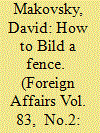

|
|
|
|
|
| Publication |
Mar-Apr 2004.
|
| Summary/Abstract |
Israelis and Palestinians must be separated for the Middle East to achieve some semblance of peace. At this point, that will take a fence. The good news is that Israel is already building a sensible barrier. The bad news is that the Sharon government may construct it in a way that spurs future conflict rather than ends it. The United States thus needs to step in to make sure that the right kind of fence gets built, in the right place--or else both sides will face more fighting in the future.
|
|
|
|
|
|
|
|
|
|
|
|
|
|
|
|
| 6 |
ID:
108756
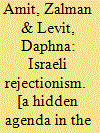

|
|
|
|
|
| Publication |
London, Pluto Press, 2011.
|
| Description |
vii, 208p.
|
| Standard Number |
9780745330280
|
|
|
|
|
|
|
|
|
|
|
|
Copies: C:1/I:0,R:0,Q:0
Circulation
| Accession# | Call# | Current Location | Status | Policy | Location |
| 056352 | 956.05/AMI 056352 | Main | On Shelf | General | |
|
|
|
|
| 7 |
ID:
073794
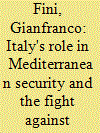

|
|
|
|
|
| Publication |
2006.
|
| Summary/Abstract |
Creating an area of political stability and security in the Mediterranean has become one of the highest priorities of Italian and European Union foreign policy, at both the bilateral and multilateral levels. Particularly important in this connection is Italy's participation in the fight against international terrorism and in regional peace and stabilization processes. Also important are its significant military contributions to operations led by the United Nations and other multilateral organizations.
|
|
|
|
|
|
|
|
|
|
|
|
|
|
|
|
| 8 |
ID:
170951
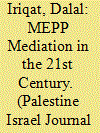

|
|
|
|
|
| Summary/Abstract |
During the last three decades, the world witnessed rising hopes for a peaceful resolution of the Palestinian-Israeli conflict. There were many efforts, most of which ended in failure. July 2000 witnessed the most significant attempt at the Camp David summit, where the final-status issues were placed on the negotiations table, but no deal was completed. Since then, violence and instability have escalated in the region, and today a peacefully negotiated deal is definitely far from reality.
|
|
|
|
|
|
|
|
|
|
|
|
|
|
|
|
| 9 |
ID:
111931
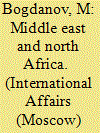

|
|
|
| 10 |
ID:
110034
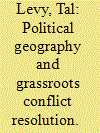

|
|
|
|
|
| Publication |
2012.
|
| Summary/Abstract |
The Israeli-Palestinian conflict is well known and understood within the intricacies and intractability that it possesses. The political geography of the region known as the Holy Land has been debated by elites since before the establishment of the state of Israel. Demographic realities have altered the geopolitical definitions of what is defined as Israel and Palestine. Currently, there is a fresh push by political elites to achieve new political resolutions that will respect the aspirations of both the Israelis and Palestinians. This process has been bogged down by new demographic realities specifically in the West Bank. An alternative mode of negotiations known as the 'Minds of Peace' experiment or MOPE uses a grassroots approach to try the overcome stumbling blocks in the current Israeli-Palestinian peace process. The MOPE experiment provided fresh and valuable perspectives on the conflict. This article discusses reflections of the author on this new and innovative approach to peacemaking.
|
|
|
|
|
|
|
|
|
|
|
|
|
|
|
|
| 11 |
ID:
128821
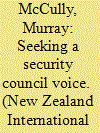

|
|
|
| 12 |
ID:
006504
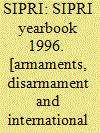

|
|
|
|
|
| Publication |
Oxford, Oxford University Press, 1996.
|
| Description |
xxxviii, 830p.hbk
|
| Series |
SIPRI Yearbook 1996
|
| Standard Number |
0198292093
|
|
|
|
|
|
|
|
|
|
|
|
Copies: C:2/I:0,R:0,Q:0
Circulation
| Accession# | Call# | Current Location | Status | Policy | Location |
| 038232 | 327.17405/SIP 038232 | Main | On Shelf | General | |
| 038362 | 327.17405/SIP 038362 | Main | On Shelf | General | |
|
|
|
|
| 13 |
ID:
079925
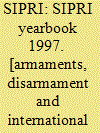

|
|
|
|
|
| Publication |
Oxford, Oxford University Press, 1997.
|
| Description |
xxxiv, 585p.hbk
|
| Series |
SIPRI Yearbook 1997
|
| Standard Number |
0198293127
|
|
|
|
|
|
|
|
|
|
|
|
Copies: C:1/I:0,R:0,Q:0
Circulation
| Accession# | Call# | Current Location | Status | Policy | Location |
| 039651 | 327.17405/SIP 039651 | Main | On Shelf | General | |
|
|
|
|
| 14 |
ID:
054577
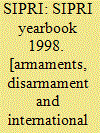

|
|
|
|
|
| Publication |
Oxford, Oxford University Press, 1998.
|
| Description |
xxxiv, 638p.hbk
|
| Series |
SIPRI Yearbook
|
| Standard Number |
0198294549
|
|
|
|
|
|
|
|
|
|
|
|
Copies: C:2/I:0,R:0,Q:0
Circulation
| Accession# | Call# | Current Location | Status | Policy | Location |
| 040190 | 327.17405/SIP 040190 | Main | On Shelf | General | |
| 040684 | 327.17405/SIP 040684 | Main | On Shelf | General | |
|
|
|
|
| 15 |
ID:
148544
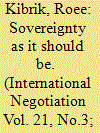

|
|
|
|
|
| Summary/Abstract |
This study suggests that one of the basic elements motivating political actors is their desire to minimize the tension caused by the theoretical gap between their theoretical knowledge and their perception of reality. In order to demonstrate this, the present study compares three different arenas of negotiations which reveal and represent the social construction of the concept of sovereignty: the peace agreement between Israel and Egypt (1979), the peace agreement between Israel and Jordan (1994), and the Oslo agreements between Israel and the PLO (1993–1995). The comparison herein demonstrates how the need to deal with the theoretical gap can explain the sides’ behavior in reaching an agreement. Likewise, the comparison reveals that the concept of sovereignty has destabilized over the course of time. It also shows how political actors in these arenas chose to cope with the theoretical gap – mainly by changing reality – although the destabilization of the concept of sovereignty allowed them to be more creative, theoretically speaking, in the context of globalization processes.
|
|
|
|
|
|
|
|
|
|
|
|
|
|
|
|
| 16 |
ID:
141141
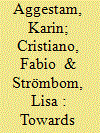

|
|
|
|
|
| Summary/Abstract |
Many contemporary conflicts are framed as antagonistic and difficult to resolve because of their zero-sum framing among the disputants. This article addresses the antagonism–agonism nexus and the political and contested nature of building peace. It has a three-fold aim: (1) to critically assess the interplay between constructive and destructive dynamics; (2) to analyse the circumstances under which conflict may move from antagonism to agonism; and (3) to advance the novel notion of agonistic peacebuilding. The Middle East Peace process is used as a critical case of intractable conflict to elucidate the enabling and restraining conditions for agonistic peacebuilding.
|
|
|
|
|
|
|
|
|
|
|
|
|
|
|
|
| 17 |
ID:
115061
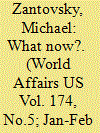

|
|
|
|
|
| Publication |
2012.
|
| Summary/Abstract |
The train wreck of the Palestinian request for recognition as a state at last year's meeting of the United Nations, which could have been seen coming for at least the whole of last summer, laid bare the total vacuity of the term "Middle East Peace Process" and the impotence of the international diplomacy surrounding it. Such a disaster often occurs when process takes over substance and justifies its own existence by belated and ultimately unsuccessful attempts at remedy. Some of it is a matter of physics-when the train sets out it is relatively easy to stop with a timely application of the brakes. When, on the other hand, it is allowed to gain full speed because of arguments among the engineers, idle hopes that the train will run out of steam, or the simple refusal to acknowledge that it is even moving, the only thing left to do is to lie down on the floor and pray.
|
|
|
|
|
|
|
|
|
|
|
|
|
|
|
|
|
|
|
|
|